|
|
|
Sort Order |
|
|
|
Items / Page
|
|
|
|
|
|
|
| Srl | Item |
| 1 |
ID:
127061
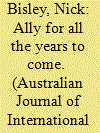

|
|
|
|
|
| Publication |
2013.
|
| Summary/Abstract |
In 2011, Australia communicated a clear choice about its strategic future. It would continue to cleave tightly to the US alliance, expand its military links and work to advance the USA's conception of regional order. Given its economic interests, why has Australia bound itself to the US alliance? What lies behind this strong commitment and what would it take for Australia to change its relationship with the USA? This article presents an analysis of the current state of the US-Australia alliance and argues that Canberra's pursuit of close relations with the USA reflects the interaction of a rational calculation of the costs and benefits of the alliance with a set of resolutely political factors that have produced the current policy setting. The article first assesses the security cost and benefit behind the alliance. It then argues that the move also derives from the strong domestic support for the US alliance, a sharpened sense that China's rise was generating regional instability that only the US primacy could manage and the realisation that the economic fallout of such a move would be minimal. It concludes with a brief reflection on what it might take to change the current policy settings.
|
|
|
|
|
|
|
|
|
|
|
|
|
|
|
|
| 2 |
ID:
057999
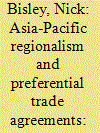

|
|
|
| 3 |
ID:
130170


|
|
|
|
|
| Publication |
2014.
|
| Summary/Abstract |
Asia's middle powers face a trilateral dilemma stemming from their relationships with the U.S. and China. This paper uses the Australian example to examine the dilemma. It shows that Australia has bound itself to the U.S. because of domestic political factors, cost considerations, a belief that it can keep its interests separate, and its perception of regional threats. The paper then argues that others are likely to resolve their trilateral dilemmas in ways that make the regional strategic dynamic more competitive.
|
|
|
|
|
|
|
|
|
|
|
|
|
|
|
|
| 4 |
ID:
160419
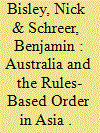

|
|
|
|
|
| Summary/Abstract |
In response to a more-contested Asia, Australia has placed the ‘rules-based order’ at the heart of its declaratory strategic policy. This move signals Australia’s commitment to this order, to its alliance with the United States, and to a more active strategic role in the region. However, a failure to match rhetoric with action risks undermining Australia’s strategic interests by emboldening China and reducing Australia’s value as an American ally.
|
|
|
|
|
|
|
|
|
|
|
|
|
|
|
|
| 5 |
ID:
161611
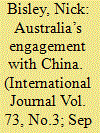

|
|
|
|
|
| Summary/Abstract |
This paper examines how Australia has managed its relationship with China. It looks at the broad trends in the relationship, with a focus on the decades after recognition in 1972. The second part examines the recent past, and particularly the ways in which Australia’s active courtship of China has begun to be tempered by concerns about the destabilizing security and strategic consequences of the country’s return to power. It assesses the options Australia faces and the growing polarization of opinion between security “hawks” and economic “doves” in public debate about Australia’s future, and then charts where Australian policy is currently placed. The paper concludes by explaining why Australia finds taking a nuanced position in relation to its engagement with China so difficult.
|
|
|
|
|
|
|
|
|
|
|
|
|
|
|
|
| 6 |
ID:
093285
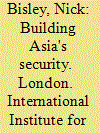

|
|
|
|
|
| Publication |
London, International Institute for Strategic Studies, 2009.
|
| Description |
159p.Pbk
|
| Series |
Adelphi Paper, 408
|
| Standard Number |
9780415582667
|
|
|
|
|
|
|
|
|
|
|
|
Copies: C:1/I:0,R:0,Q:0
Circulation
| Accession# | Call# | Current Location | Status | Policy | Location |
| 054633 | 909.82/BIS 054633 | Main | On Shelf | General | |
|
|
|
|
| 7 |
ID:
137620
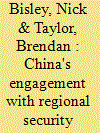

|
|
|
|
|
| Summary/Abstract |
Using a case study of Beijing’s participation in the Shangri-La Dialogue, a prominent annual security gathering in Singapore, this article analyses China’s approach to Asian security multilateralism. It does so by developing and employing a typology consisting of four characterizations of multilateral engagement: China as “blocker”; China as “socialized participant”; China as “shaper”; and China as “opportunistic participant”. The article shows that in its approach to the Shangri-La Dialogue, China displays all four of these traits, while noting that some are more prevalent and compelling at certain points in time. It uses this finding to draw conclusions about Beijing’s future engagement with the Shangri-La Dialogue and its broader approach to security multilateralism. It also contributes to the larger debate over whether China is a “revisionist” or a “status quo” rising power.
|
|
|
|
|
|
|
|
|
|
|
|
|
|
|
|
| 8 |
ID:
110069
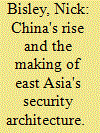

|
|
|
|
|
| Publication |
2012.
|
| Summary/Abstract |
This article examines the recent growth in multilateral security processes, the efforts to forge a 'security architecture', and focuses particularly on the role that China's rise has played in this process. It sketches out growth in Asian security cooperation and the efforts to forge a new security architecture. It then considers the question of China as a cause of this increase in security cooperation as well as China's own motives in actively engaging with this process. The final section then reflects on the contribution that security cooperation currently makes to the regional order. The article argues that China's rise has been an important prompt to the efforts to devise new security arrangements, but has not been the only source of this trend. It concludes that while multilateral security cooperation will be important in the emerging regional order, alone it will not provide a robust foundation for regional stability and security.
|
|
|
|
|
|
|
|
|
|
|
|
|
|
|
|
| 9 |
ID:
165153
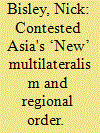

|
|
|
|
|
| Summary/Abstract |
Multilateralism has become an increasingly significant part of Asia's international relations. This paper critiques the premise that there are two phases of regional multilateralism, pre- and post-global financial crisis and instead argues that there has been one long 25-year expansion phase. Initially, this was prompted by the risks and opportunities of globalization but was adapted as a strategy to manage a changing regional order. More recently, regional multilateralism has taken on competitive characteristics reflecting Asia's more contested dynamics. The US and its allies are trying to use multilateralism as part of their broader strategy to sustain the prevailing regional order. China is also attempting to use multilateralism as a part of its efforts to change the region to one more in line with its interests and values. Multilateralism has become a sublimated form of contestation over the form and function of Asia's international order. A key consequence of this will be to weaken the policy impact of existing institutional efforts and to promote zero-sum approaches to international policy among many Asian states.
|
|
|
|
|
|
|
|
|
|
|
|
|
|
|
|
| 10 |
ID:
051568
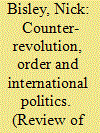

|
|
|
| 11 |
ID:
082601
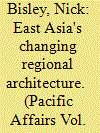

|
|
|
|
|
| Publication |
2008.
|
| Summary/Abstract |
This article examines the current state of East Asia's regional architecture with a focus on efforts to construct an East Asian Economic Community (EAEC). First, the article considers trends in regional cooperation and assesses the elements which constitute an EAEC and which distinguish it from other forms of regional cooperation. Second, it analyzes the different forms an EAEC might take, and their respective plausibility, and then sets the putative EAEC alongside APEC to consider how it might profitably learn from and relate to this already existing regional organization. The article argues that the revival of East Asian regionalism is driven by efforts to manage the economic and political consequences of globalization. There is a genuine desire in the region for increased economic cooperation and a belief that institutionalized cooperation can bring payoffs although this is not matched by a consensus on how to achieve this end. While unlikely to emerge in the next five years, the article argues that, due to changing political and economic circumstances, and particularly China's interest in regional institutions, there is reason to be cautiously optimistic about the chances of an EAEC over the medium to longer term.
|
|
|
|
|
|
|
|
|
|
|
|
|
|
|
|
| 12 |
ID:
054345


|
|
|
|
|
| Publication |
Houndmills, Palgrave Macmillan, 2004.
|
| Description |
viii, 209p.hbk
|
| Standard Number |
1403935785
|
|
|
|
|
|
|
|
|
|
|
|
Copies: C:1/I:0,R:0,Q:0
Circulation
| Accession# | Call# | Current Location | Status | Policy | Location |
| 048810 | 947.0854/BIS 048810 | Main | On Shelf | General | |
|
|
|
|
| 13 |
ID:
072429
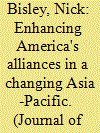

|
|
|
| 14 |
ID:
185167
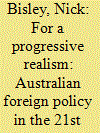

|
|
|
|
|
| Summary/Abstract |
What ideas and concepts might be used to reinvigorate a progressive approach to Australian foreign policy? In contrast to the clarity of the international vision provided by right-wing movements, there is uncertainty about the contours of a progressive approach to contemporary Australian foreign policy. This article outlines the basis of a ‘progressive realism’ that can challenge right-wing accounts. Progressive realism combines a ‘realistic’ diagnosis of the key dynamics that underpin contemporary world politics with a ‘progressive’ focus on the redistribution of existing power configurations. Taken together, these two building blocks provide the foundations for a left-of-centre foreign policy agenda. We apply progressive realism to four policy areas: pandemic politics, aid and infrastructure in the Pacific, climate change, and a crisis in the Taiwan Strait. This analysis, in turn, highlights the challenges and opportunities for progressive political actors in crafting foreign policy both within and beyond Australia.
|
|
|
|
|
|
|
|
|
|
|
|
|
|
|
|
| 15 |
ID:
114076
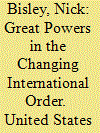

|
|
|
|
|
| Publication |
United States of America, Lynne Rienner Publishers, Inc., 2012.
|
| Description |
ix, 209p.Hbk
|
| Standard Number |
9781588268334
|
|
|
|
|
|
|
|
|
|
|
|
Copies: C:1/I:0,R:0,Q:0
Circulation
| Accession# | Call# | Current Location | Status | Policy | Location |
| 056712 | 327.1/BIS 056712 | Main | On Shelf | General | |
|
|
|
|
| 16 |
ID:
080926
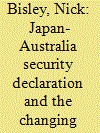

|
|
|
|
|
| Publication |
2008.
|
| Summary/Abstract |
The March 2007 Japan-Australia Security Declaration has garnered more than its share of hyperbole. Described variously as an historic milestone for peace or an agreement designed to encircle China; the declaration's actual strategic consequences are somewhat unclear. The purpose of this article is to provide a critical analysis of the security declaration and to assess its impact in the context of the changing patterns of the region's security setting. Some have argued that it marks a small but qualitatively significant shift in the essential features of the regional security architecture. The article assesses this claim and argues that while the declaration is of some diplomatic importance, and clearly contributes to improving cooperation in disaster relief and other humanitarian operations, it is of little strategic significance to the broader patterns of East Asian security over the short to medium term. Each side's operational constraints, their different strategic priorities, most obviously their perceptions of China, as well as the continued military predominance of the US, means that the agreement will be of little immediate significance for East Asian security. That said, it remains an important development for the respective parties and is a leading edge indicator of broader forces for change that are increasingly present in East Asia
|
|
|
|
|
|
|
|
|
|
|
|
|
|
|
|
| 17 |
ID:
069840
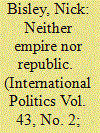

|
|
|
| 18 |
ID:
080910
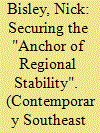

|
|
|
|
|
| Publication |
2008.
|
| Summary/Abstract |
Over the past decade, the US-Japan alliance has been strengthened and subtly but substantively transformed. In response to a range of domestic changes and new international challenges, a relationship that was becoming frayed in the immediate aftermath of the Cold War has been rejuvenated and re-tooled with significant consequences for East Asia's strategic setting. This article provides a critical analysis of this process with two ends in mind. First, it provides a systematic overview of the changes, their sources and what they mean for the alliance partners and their security interests. It argues that the US-Japan alliance now has two distinct functions, one relating to regional stability and the other focusing on shared global strategic aims. The alliance is in good health, but its continued vitality will require careful management. Second, it assesses the regional consequences of this change and argues that while alliance enhancement has been intended to promote mutual and regional security there is reason to doubt whether the latter goal has been served through the enhancement process
|
|
|
|
|
|
|
|
|
|
|
|
|
|
|
|
|
|
|
|
|